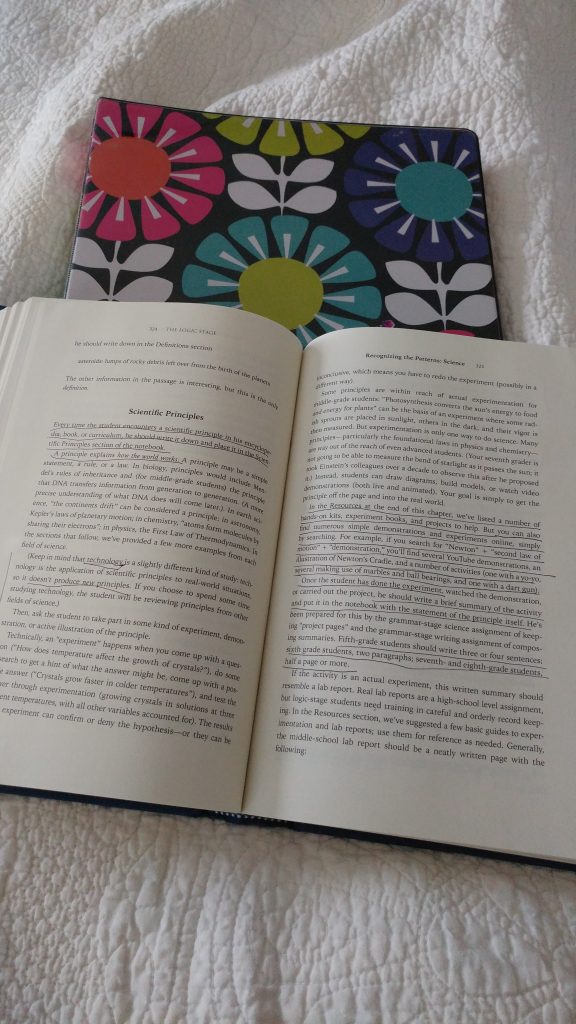It seems hard to believe, but my son will be in middle school come Fall 2018. Taking advantage of our Christmas break, I started planning for next year. Here are the steps I took to plan for middle school:
- Begin with the end in mind. Thus said Stephen Covey, the author of 7 Habits of Highly Effective People. We don’t hear much about that book anymore, but people are still reading it. It’s #11 Most Read on Amazon. If you were to re-read it today, you would find it just as relevant today as before the internet, which is when the book was first published. So what is your “end” or purpose in homeschooling through middle school? Getting the child ready for high school, right? That’s my goal. For that, I need to follow some kind of bigger outline for the next four years, not just 5th grade.
- Settle on a philosophy of education. In K-4th grade, one can get away without a philosophy of education. The first years are all about reading, writing and arithmetic. If you can do some science experiments and throw in some history or geography, more power to you. But nobody needs a philosophy of education for that endeavor. Most textbooks are open-and-teach. Most home educators have no problem teaching the early grades because it’s elementary stuff. By the time your child is 10, though, things get serious. You have to come up with your overarching approach, your philosophy of education. Are you a conservative Christian who does not believe children should read fantasy books? Are you a secular parent who shuns science books written from a creationist perspective? Are you completely devoted to the Charlotte Mason method? These are questions you must answer. As for me, I still have a classical approach, with a slight nod to Charlotte Mason and the Moore Formula.
- Read up on the middle school years. For me, this meant reading the chapters under The Logic Years in The Well-Trained Mind by Susan Wise Bauer. Prior to 2017, I had not read this section of the book. I could not go there in my mind, being knee-deep in the Grammar Stage with two very different learners. The section on middle school or the Logic Stage took me two afternoons to read, underline, and research. This was time well-spent. When I finished, I felt so energized because knowledge is power. I started writing things down at some point. Nothing big, just enough to know which curriculum to use for which year, how that will work with the other child (who is not in middle school yet), and how many subjects we can still do together. If you don’t know what to read, a little internet research will give you at least 20 blogs about middle school homeschooling. Let us be thankful to the homeschool moms who have gone before us and have given us pointers in these blogs. Let us learn from their mistakes, which they so generously share with us, out of the goodness of their hearts.
- Surprise consequence of getting a clear picture. Now that my middle school years were somewhat organized and on paper, I felt bad about the rest of this school year, when my oldest is still in 4th grade. So I went ahead and planned out the rest of the curricula for the upcoming semester. Oh, I had all the curriculum lined up and knew how to proceed, but did not take the time to write out what to do every day. Too much work, I thought. And then, I get frustrated because it will not work out in real life the way it is on paper. Never mind that, is what you should tell yourself. We make plans on paper so that we have a quick-reference tool in the middle of the semester, to know if we are behind or ahead. This kind of planning helps to know if we can relax on the day when the children seem out of sorts and beg for a small break, or a family emergency stops homeschooling in mid-sentence. It might even help if you had a homeschooling mom asking for advice on planning and then you can share some insights from your experience. Bottom line – write it all out!
- Buy some curriculum, if needed. Many times, we have accumulated curricula for when children are older. Go through those boxes and decide what you should keep and what you should give away or sell. Then, buy curriculum for next year or, better yet, see if you can attend a homeschool convention where they run special prices or if your particular publisher runs specials in April or July, for instance. I think I have all the curriculum I need for 5th grade except for grammar. I chose to go with Ms. Bauer’s top recommendation, Rod and Staff, in that area. Since they do not have their own website, I had to get it from Milestone Books. All that legwork needs to happen now, so that I can cast a glance at these books before we start 5th grade in August. It will be here before I know it.
